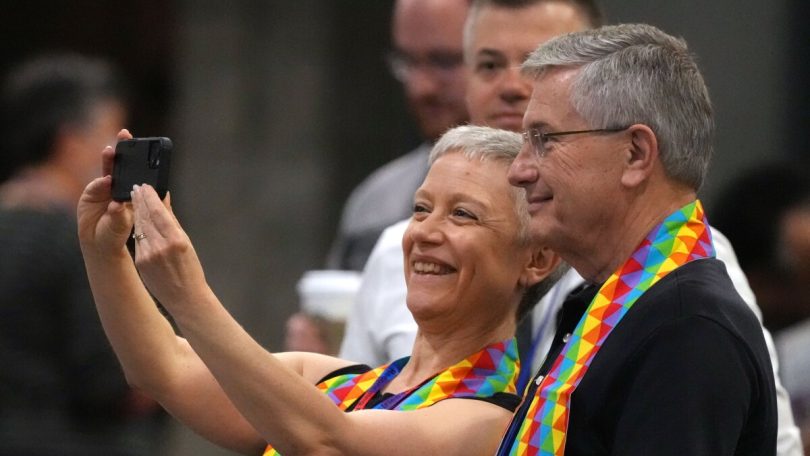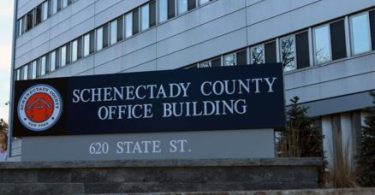The United Methodist Church [UMC] has repealed its 50-year ban on LGBTQ clergy, and approved new language opening the door for same sex marriages.
Several delegates from Bloomington-Normal attended this year’s two-week General Conference in Charlotte, North Carolina, convening church leaders and lay parishioners representing the United States, Europe, Africa and the Philippines.
The move toward inclusion marks a striking reversal to the church’s 2019 policy doubling down on anti-LGBTQ policies dating to the 1970s — a topic of discord Anish Hermon said has taken the church “off topic for a very long time.”
Hermon is a parishioner and “tech guy” at Hope Church in Bloomington. He was drawn to Hope, in part, because the church ignored exclusionary policies preventing full participation of LGBTQ people.
One of Hermon’s parents is Hindu; the other is Methodist. He committed to Methodism, in part, because of its democratic structure.
courtesy
/
Hermon
Anish Hermon attends Hope Church and is the resident “tech guy.”
“I knew there were things that went against my values with not including everyone,” Hermon said. “I was like, ‘How do you change that?’ Well, you get into the weeds.”
Hermon was elected as a lay delegate in the Illinois Great Rivers Conference, the body representing central and southern Illinois. Rules and regulations in the United Methodist Church are maintained in a Book of Discipline. Conferences meet every four years for a global “general conference,” determining doctrines through a decentralized process similar to the three branches of the United States government. Delegates form the legislative branch, debating and voting on church doctrine.
Under the previous rules, practicing LGBTQ clergy risked being stripped of their ordination. Pastors who performed same-sex weddings could similarly be placed on trial and removed from the clergy. Some churches ostensibly instituted a culture of “Don’t ask, don’t tell.” Others, like Hope, openly touted a culture of LGBTQ inclusion.
The chance to disaffiliate has passed
The UMC gave parishes a window to disaffiliate and keep their property, which is owned by the church. More than 7,500 American parishes took the deal — in part because they felt the church wasn’t effectively enforcing its ban on gay clergy and gay weddings. A more traditional, burgeoning denomination called the Global Methodist Church is one option for parishes who left the UMC; others may choose to remain non-denominational.
Bloomington-Normal’s six Methodist churches opted to stay, and the window to disaffiliate remains closed.
Pastor Sara Isbell of Wesley United Methodist Church in Bloomington said she’s not sure how parishes unsettled by LGBTQ inclusion will handle it.
“My fervent hope is that we can go back to the collaboration, the cooperation, the listening and the communicating that we tried to do at General Conference, and we can still find a way to live together,” she said.
Isbell estimates the vast majority of American delegates support affirming LGBTQ clergy and parishioners. But as a global denomination, the conference demanded tough negotiation, navigating nuanced social and political contexts. An intense debate over the definition of marriage, for example, does not strike “one man, one woman” from the doctrine; rather, marriage is described as a covenant between one man and one woman or two consenting adults.
While Isbell is encouraged, she knows some of her parishioners will be disappointed by the changes.
“Some of them were happy in 2019 when we came home from that conference,” said Isbell. “I’ll be preaching on it next Sunday, and I think my presentation might be different from what you have at Hope Church. While I may feel a sense of strong celebration with some of the folks in my church, I also deeply love and respect the people that don’t feel that way.”
In what looks like a compromise, the rules no longer threaten punitive action on gay clergy or those who perform same-sex marriages — but it doesn’t affirm them, either.
“Churches that are not ready to have appointed to them a pastor that identifies as LGBTQ, for example, or pastors who are not ready to conduct same-sex marriage ceremonies — they don’t have to,” said Isbell.
Regionalization protects the changes
The goal of the new doctrine was to get to neutral. Thus, Isbell and other delegates hoping to affirm explicit LGBTQ participation ultimately voted against it, resulting in an overwhelming consensus.
“It would have been great to specifically say LGBTQ people are loved just as much, or are just as accepted,” Isbell said. “We have to wait.”
To that end, another work product of this year’s general conference was a move toward regionalization, which gives churches agency to flex the rules to match global social and political contexts. The measure must be ratified at the next general conference, four years from now.
“If regionalization passes, then perhaps a U.S. regional conference could take a more affirming stance,” said Erik Slingerland, a reserve delegate and seminarian from Goodfield. Slingerland sought to get involved with the Illinois Great Rivers Conference to help pepper the legislature with younger, more progressive voices.
“That does seem to be where a lot of the remaining United Methodists in the U.S. are,” he said.
For Slingerland, participating in the process and waiting for the Methodist church — the big, glacially moving body he grew up in — is worth the wait to better align with his values.
“Seeing so many folks who wanted to remain United Methodist also fight for some degree of more inclusion was definitely a big factor for me,” he said. “After the last couple weeks, it felt worth it.”
Paul Jeffrey
/
UM News
Erik Slingerland holds a sign during a demonstration in support of the people of Gaza held on April 30, 2024, during the United Methodist General Conference in Charlotte, N.C.
Feeling the pride
Simultaneously exhausted and energized, Bloomington-Normal’s delegates return from UMC’s general conference feeling prouder of their faith community, who collectively formed a joy bomb conga line to the O’Jays Love Train when the new doctrine passed.
But they come home to a perpetual challenge faced by churches nationwide: an aging population and decline in participation.
Conservative congregants fear the UMC’s gradual move toward inclusion looks like a knee jerk response to pressure from progressives that will exacerbate attendance losses. But Isbell rejects the notion that the church is merely caving to culture.
“While there is a rumor afoot that we, the remaining United Methodist Church, has just signed our own death warrant, counter to that rumor, I find that when you open the doors a little wider, more people can come through,” Isbell said.
“This is a move to share the saving love of Jesus Christ with more people.”







